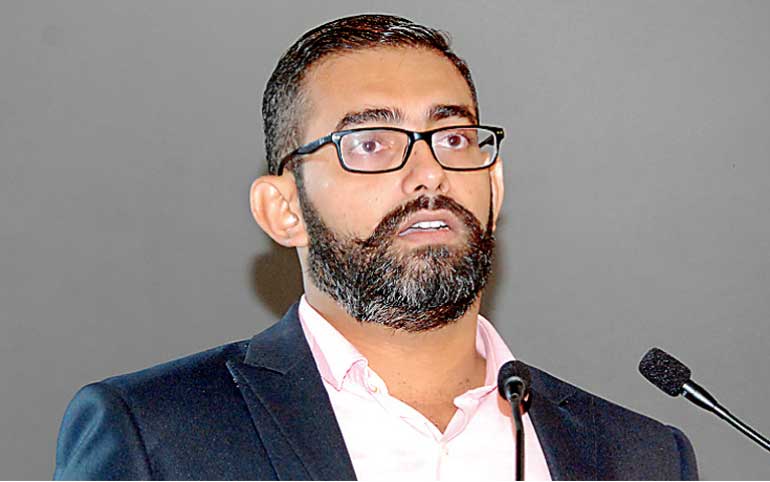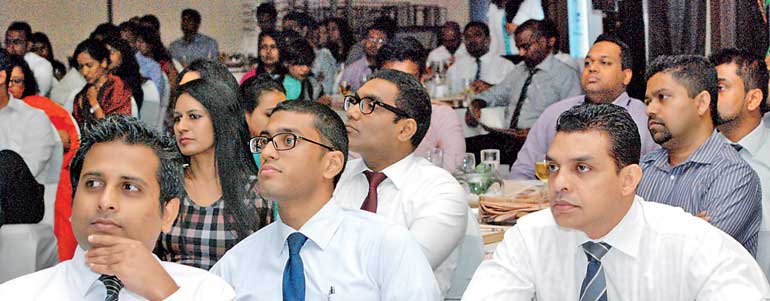Tuesday Feb 17, 2026
Tuesday Feb 17, 2026
Wednesday, 6 July 2016 00:00 - - {{hitsCtrl.values.hits}}

PickMe Cofounder Fathhi Mohomed
By Devin Jayasundera
There is no doubt that PickMe is the country’s hottest start up today. Its ingenious matchmaking platform and rapid proliferation in attracting users is pushing over the traditional taxi industry in to the oblivion. The brand of PickMe is so strong that it is already becoming synonymous with the word ‘taxi’. Even the entrance of Silicon Valley unicorns as Uber has not been able to curtail the growth of this local success story.
At the CIM ‘Disruptive Innovation’ summit PickMe Cofounder Fathhi Mohomed shared some of his thoughts on how to innovate in a local context and what it ultimately means to disrupt an industry.
An answer to a problem
In the post-smart phone world era the norm was to have multiple contacts in your mobile phones of taxi services or drivers to contact in situation of urgency. This general practice leads to serious inefficiencies and unreliability, especially when looked at from an entrepreneurial lens of PickMe.
“Previously everyone had three or four numbers in their phones. If they want taxis they call those. If they were lucky enough they would be able to get a taxi in the first call. Even though you got the confirmation, you are not 100% sure until the vehicle arrives to you,” said Fathhi.
The matchmaking platform that PickMe introduced via its mobile app eliminated the unnecessary processes involved in hailing a taxi. This was the initial major disruption that PickMe incurred in the taxi industry according to Fathhi. The technology behind the platform enabled to identify the available vehicles around the vicinity of the passenger and effectively connect with a driver seamlessly.
Another major feature that PickMe disrupted was the supply side of the industry. Fathhi pointed out that generally drivers always have to get back to their original position to get rehires which leads to serious inefficiencies thus ultimately impacting the bottom line of their earnings.
“In this industry the ‘loss mileage’ was a major concern for all the drivers. If a driver is running for 100 km a day, they will make money only for 60 km. The rest of the 40 km is dead loss weight.” For a non PickMe driver who is originally stationed in Colpetty generally has to return to its starting point even if he gets a hire to Ratmalana. But with our technology we have the ability to match a passenger for the same driver from Ratmalana itself,” said Fathhi.
This development has allowed PickMe to reduce the loss mileage from 5-10% from the total mileage of its fleet.
Continuous innovation
Fathhi outlaid some key features that go beyond the core product that has enabled PickMe to dominate its position in the market and be resilient in the midst of competing forces as Uber, its biggest competitor.
The ETA (estimated time of arrival) sharing ability coupled with the SOS button demonstrates the high emphasis on customer safety by PickMe. Whilst the ETA enables shared real time GPS tracking, the SOS button allows the passengers to notify anyone by a simple push in a situation that he feels uncomfortable or threatened.
The ability to filter drivers and type of vehicles according to customer specifications is another recent innovative feature of PickMe.
PickMe has not only been focusing on the single user market but has also successfully disrupted the corporate hire segment in the taxi industry. Fathhi identifies that before PickMe companies had to cut a deal with the taxi company for their transport arrangements. Most often the processes involved in billing and tracking the rides from theses leads to bureaucratic entanglements and accounting headaches.
The portal offered by PickMe streamlines the processes in hiring cabs and more importantly it provides detailed list information thus increasing accountability and responsibility of employees in using office transportation.
“Every ride made under the company’s account will be recorded in a GPS map. At the end of the month the company will get a bill with all the information from the type of transport, distance to the employee name.”
With the large amounts of data captured by its GPS sensors, PickMe is aggressively using big data analytics to understand passenger movements.
“If you are running a retail store this would enable us to understand from where people are coming in to your store. For example if the customers have entered your clothing store and going to another competing clothing store, it could mean that there’s something missing in your store. You can take business decisions by taking in to account that kind of movement. This can work in niche areas in different industry.”
Taking a leaf from the Uber model, PickMe is also keen on promoting the concept of part time driving across all income class levels and professions.
“Part time driving was not existent years ago. Today we have seen architects, engineers, bankers and managers taking this opportunity after work hours as a means to pay off their lease,” said Fathhi.
PickMe’s role in the recent floods was generously hailed as a supreme example of how technology could be levered for social upliftment.
“When the flood crisis happened we were able to modify our app as a rescue mission app. As soon as the service was offered for the public, to our surprise we got about 10 requests per minute indicating their coordinates. We were able to rescue 300 plus people using this service.”
Drivers first
The drivers’ fraternity is still an integral part of the taxi business at least until the mainstream usage of self-driving cars.
PickMe believes that how drivers perceive themselves and how they are treated as an utmost vital aspect in their business which was often ignored by the traditional taxi service. Fathhi interestingly notes that the GPS system in the vehicle and the use of the sophisticated mobile application has transformed how the passenger perceives and interacts with the driver.
“This technological enablement of the driver has generated an overnight transformation of his social status. When we gave the device to the driver with sophisticated technology the passengers travelling behind him has also started to respect them in different way,” said Fathhi.Understanding that drivers are the key point of its brand identity PickMe currently conducts immersive training programs for all drivers to ensure high quality customer service.
“Before a driver joins the fleet they have to go through a one day comprehensive training which consists of communication skills from answering to phone calls, to greet a passenger, dress code and presenting themselves properly.” Fathhi also added that the training intends to prepare the driver how to conduct himself in an event of a crisis such as dealing with unruly customers.
One of the key spills offs that PickMe triggered was bringing a sense of formality and order to an industry which had an unfavourable reputation among the general public. According to Fathhi this new environment has given a significant upside for PickMe drivers in terms of financial stability where securing loans and other financial products have become much easier as all earnings are documented.
In conclusion Fathhi stressed the innovative spirit and the hunger for disruptive solutions as the key drivers for the company’s achievements. “PickMe has been able to go beyond companies who have been in the taxi service for more than 20 years. Our ability to disrupt the industry has throttled us to become the largest player in the market in a short period of time.” - Pix by Shehan Gunasekera
